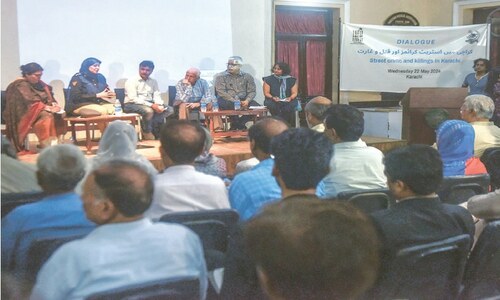KARACHI, Feb 6: Zebunnisa gets no visitors at her ramshackle tent just across the street from the Sindh Institute of Urology and Transplantation (SIUT) in Karachi’s old city area. The 31-year-old kidney patient has been camping here for the last two-and-a-half years.
Her swollen face and bloated belly are more than enough to indicate that she is suffering from some serious ailment.
“[Zebunnisa] needs dialysis three times a week,” says her mother as she makes tea on a fire kept burning with trash collected from the street. “We are poor people. We cannot go back to our village [in Thatta district] after every dialysis and then come back for the next one,” she says.
Scores of patients and their families live in small rudimentary tents on the pavements and vacant plots of land around the SIUT. Most of them have been here for months, even years. Their living conditions are unimaginably poor. With thin sheets of old and tattered cloth to shelter them from the elements, they spend their days and nights sprawled on worn-out mats made more uncomfortable by the kerbstones they are spread on. “We eat at Sailani’s (a free food facility close by) and struggle to find toilets where we can relieve and wash ourselves,” says Mohammed Hasil, 51, a resident of Sakrand in Nawabshah district. He has been living in his decrepit shelter with his wife for more than two years to undergo dialysis twice a week. “I have no one to pay for my travel between Karachi and home,” he says.
These people will die if they do not undergo regular dialysis, say their relatives and doctors.
The only possible way for them to get that treatment without a break is to stay close to the SIUT, Pakistan’s premier institution for free treatment of all kidney-related diseases among other rare ailments.
Mirza Naqi Zafar, a professor of pathology at the SIUT, says the institute’s management is painfully aware that something needs to be done about patients who do not have money to travel from their far-off hometowns to Karachi every time they need dialysis. “We have the will, but unfortunately we do not have the resources,” he says.
The money the institute generates through private and public donations is barely enough for the ever-expanding range of treatments it is offering and the physical infrastructure that makes these possible. In a single day, the SIUT performs dialysis on 650 patients in a round-the-clock operation. And this is just one of the many facilities at the institute. Others include kidney and liver transplant, removal of kidney stones, treatment of prostate and other cancers of the kidney and bladder etc. From its out-patient departments over-flowing with patients to its emergency ward with beds having the minimum possible walking space between them and from its more than 250 dialysis machines working non-stop to its state-of-the-art laboratories, the institute has almost everything it may require to treat any disease related to the kidney, bladder or liver.
To keep such a vast operation running is a gigantic task in itself but to keep the facilities free of cost for all and sundry is almost miraculous. Currently, the institute’s daily running cost comes to five million rupees. Add to this the capital investments needed for new buildings, new machines, and staff training (the SIUT runs Pakistan’s only animal lab for teaching and learning complex surgeries and transplants on monkeys, dogs and cats, etc) and what you get is a sum that the institute struggles every year to put together. “Every now and then we have to beg and borrow,” says Dr Adib Rizvi, the founder and head of the SIUT, “but we manage to keep going regardless of such hurdles.”
Vacant buildings
With its financial resources stretched so thin, the institute cannot but ruefully watch from the sidelines as the number of campers outside its premises keeps increasing almost by the day. There are many private and public buildings in the area around the SIUT which are empty and can be easily used for accommodating them, says Dr Rizvi.
All that the government and private building owners need to do, according to him, is to open their hearts and the problem will be resolved. “Those buildings are not accruing any financial benefits to their owners, so why can’t they be made available to the patients and their families on nominal rents?” he wonders.
But this looks like a remote possibility and the only option may be for the SIUT to take charge and do something about the problem on its own. For that, Dr Rizvi adds, we require large sums of money which can only be arranged if some of us open our hearts and wallets ever more widely for the SIUT.













































